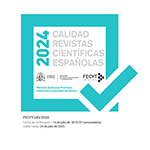Challenges in social intervention with women in mobility: the case of the Spanish southern border
Abstract
The aim of this article was to analyze some of the challenges posed to social intervention when working with migrant women in the context of the Spanish southern border, focusing on documentary analysis and the discourses of professionals who work in organizations in Andalusia, Ceuta and the Canary Islands. Using Zapata-Barrero and Ferrer-Gallardo's (2012) multiple concept of border as an analytical tool, we identified challenges linked to the ontological, epistemological and ethical borders that arise in social intervention processes. Among the conclusions, we highlight how social action, in this context, has to deal with a radical categorization between people who are expellable and dispensable based on control policies, and those who are welcome, based on protection frameworks that tend to place the subjects within the category of “victim”. Alongside this dichotomy, a reflection emerges on how to accompany the people with whom we intervene as right holders and key parts of social integration models and mechanisms.
Downloads
Article download
License
In order to support the global exchange of knowledge, the journal Cuadernos de Trabajo Social is allowing unrestricted access to its content as from its publication in this electronic edition, and as such it is an open-access journal. The originals published in this journal are the property of the Complutense University of Madrid and any reproduction thereof in full or in part must cite the source. All content is distributed under a Creative Commons Attribution 4.0 use and distribution licence (CC BY 4.0). This circumstance must be expressly stated in these terms where necessary. You can view the summary and the complete legal text of the licence.









